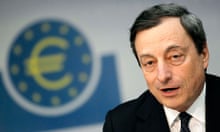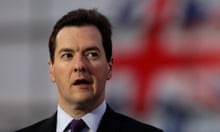If to err is human, then so is to muddle through. In politics, as in ordinary life, humans tend to prefer the known to the unknown – often rightly, sometimes foolishly. The known may have faults, but at least they are familiar. The unknown, on the other hand, is not just unknown but perhaps even unknowable – and its consequences could be worse.
For the past three years, the European Union has muddled through the eurozone crisis. It gets few plaudits for doing so, especially from its enemies. Muddling through is not cool. No politician runs for office by saying, "If elected I will try to muddle through," though in practice that is what they often do. Commentators, paid to pretend that the world is simpler than it really is, naturally abhor muddling. So far, however, muddling through has worked, after a fashion, as it often does. Things are bad, but in most European countries not disastrously so.
But now, in the case of the eurozone, muddling through may not cut it much longer. With its second election on 17 June, Greece may force the issue by jumping or being pushed out. In Spain, the banking crisis continues to deepen, with the banks on the edge of an insolvency that has all but bankrupted the country's public finances already. Meanwhile Germany continues to resist all demands for further bailouts and rescue packages. The latest of a succession of last-ditch EU summits and G20s are only weeks away, stretching the already frayed credibility of the international political order still further.
Even so, there may still be mileage in muddling through. Do not underestimate this possibility. Muddling is nothing if not flexible, and in the last month the EU has broadened its repertoire of muddling by accepting that some form of growth strategy, as demanded by France and Italy (and indeed Britain), must now have greater priority in the European toolbox. Other adaptations will surely be made too. Many believe Germany will relax its hostility to eurobonds before the G20 convenes.
There is no mistaking the sense that something more strategic is imminent. Whether this will be an act of policy or an emergency response to events is not yet clear. To say this, however, is not to imply that it means a better outcome for Europe's economies, workers and citizens, especially in the short to medium term. Talk of a new strategic approach is being driven much more by the deepening nature of the financial and economic problems in the eurozone than by any fresh clarity about how to respond or about where that response is likely to lead.
It needs repeating that crises of this kind are inherently difficult stuff, fraught with uncertainty. There are no maps, no pain-free fixes, no battle-ready alternative strategies with instant credibility. If anything, the reverse. No columnist or politician who pretends the solution is obvious – leave the euro, defend the euro, destroy the EU, federalise the euro, throw out this government, elect a different one – should be trusted. They don't know what will work. The bankers don't know what they are doing either. Apocalyptic depictions of the crisis and its possible outcomes make exciting copy but are almost a political cop-out. The question of what to do remains unanswered.
A new course is therefore needed, but exceptionally hard to define. Reason may supply solutions which founder on realities. Conversely, crisis may provoke surprisingly radical changes. Politicians may set the course, but their ship is almost invariable blown elsewhere. Jubileed out, I've started reading Blair Warden's latest book on the Cromwellian era. It begins with the observation: "Unrevolutionary purposes bore revolutionary results." But the opposite can also be true. Set out to create the perfect regulatory alternative and you can end in anarchy.
The fact that the outcome of the voyage is unknowable does not mean that it should not be begun. Nevertheless, not beginning is still a rational response to uncertainty. If we aren't sure what to do, and if we believe that simplistic solutions may make things worse not better, then doing nothing has a certain logic. It is a very human response. Muddling through can be sensible. Kicking the can down the road is still mostly better than kicking it into the quicksands.
All this is compounded by the nature of modern liberal democracy. It's easy to condemn politicians who fail to stand up to bankers, press barons, vested interests and the rest. But modern democracy is a confusing business. Voters can often turn against politicians who do tough things on our behalf. It has happened in Greece. It may happen to Barack Obama in November. The afterglow of such kickings is short-lived. Indecision is thus understandable, though not a virtue in itself.
What is the long-run strategy for exit from the crisis? Please do say if you know. Unless you do, then muddling along may have to suffice. Even the FT's Martin Wolf, often invoked by policy-makers and commentators for the power of his critique of current policies, wrote today that he does not know the answer. Nor does he know how much pain the Greeks or the Spaniards can endure. If the Irish are a guide, then perhaps the answer is more than we think.
Any strategic solution has to have good reasons for ignoring the following: first, that governments are indispensible to framing the outcome, especially by stimulating demand. Second, that the outcome will only be achieved and guaranteed internationally, not by one nation approaches. Third, that policymakers must get ahead of events, which is why the European commission's banking plans this week are a good sign. Fourth, that international banking reform remains a central priority. Fifth, that Europe will be better able to stabilise the markets as a fiscally unified set of states, in other words by reforming and possibly shrinking but not abandoning the eurozone.
The lesson of the past decade is that when international finance becomes too powerful, no public good is served by doing nothing about it. If finance is to be regulated, therefore, it must be done by bodies with power and credibility. National governments, often weak domestically, have failed in this task. Few others exist. A stronger EU might do better. Right now, Europe is undoubtedly part of the problem. But it could also be a big part of any viable solution.





